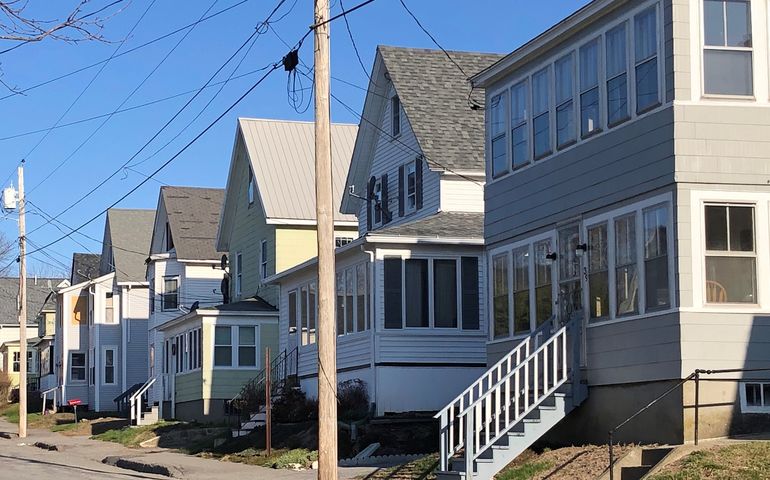Eviction relief efforts ramp up in Maine as end of ban looms
 Photo / Maureen Milliken
With the pandemic-related eviction ban due to end June 30, Maine organizations are looking for ways to keep tenants in safe housing.
Photo / Maureen Milliken
With the pandemic-related eviction ban due to end June 30, Maine organizations are looking for ways to keep tenants in safe housing.
A federal ban on housing evictions is due to expire at the end of June, and in anticipation a variety of organizations in Maine are looking to stem what could be a giant tide of removals from rented residences.
MaineHousing and Pine Tree Legal have paired up to make sure tenants get legal assistance, a lack of which is the biggest barrier to staying in housing, industry experts said. In addition, a bill in the Legislature requires landlords to inform tenants being evicted of their legal options.
Even Airbnb is getting involved — the short-term rental platform announced last week that is banning properties from being listed where a tenant had been previously evicted for rent nonpayment.
“As the eviction moratorium ends, we know that many Mainers may face eviction — the short-term rental platform announced last week that is is banning properties from being listed where a tenant had been previously and we need to do what we can to help,” said Daniel Brennan, director of MaineHousing. “Over the last year, many people are in unforeseen circumstances beyond their control." In response, the state's housing authority has stepped up rental assistance and housing stability programs.
MaineHousing is providing funding to Pine Tree Legal Assistance to get tenants resources and education that will help them remain stably housed, Brennan said. The $1.5 million is coming from federal Emergency Rental Assistance granted to Maine.
Supporters, including the Maine Affordable Housing Coalition, say that legal representation is one of the most effective ways for tenants to avoid eviction and the negative impact, including losing belongings and often becoming homeless.
The federal government's eviction ban began in September and was extended through the end of June. It included rental relief money through federal COVID-19 aid packages. The ban applies to property owners with federally backed mortgages, and keeps them from evicting, or initiating evictions of, tenants whose income has been limited because of the pandemic. The owners also can't assess fees or penalties on tenants for late rent payments.
In Maine, Gov. Janet Mills initially announced an eviction ban in April 2020, limiting evictions to "for cause" that doesn't include late rent payments. The state government, working with MaineHousing, several times extended the rental relief program that provides money to those who can't afford to pay their rent.
Before the pandemic, Maine averaged 5,000 evictions a year, with about 85% for rent nonpayment. Federal financial aid has helped keep people in their homes — MaineHousing helped support more than 9,000 rental households in 2020, and still has federal rental aid available.
Across America, according to the Center on Budget and Policy Priorities, 10.5 million families who rent are behind on payments and could face eviction when the ban expires.
"As rent relief applications continue to be backlogged in many parts of the state, we are very concerned that there could be a significant rise in evictions in Maine in the coming months," Greg Payne, director of the coalition, told Mainebiz. He said the MaineHousing-Pine Tree Legal agreement is a significant measure, as is the legislative bill.
Leveling the playing field
A recent report by the coalition, which represents 130 organizations in the state, found that tenants frequently lag behind landlords in legal representation, and case outcomes strongly reflect the imbalance. The report also found that eviction filings disproportionately affect neighborhoods with higher numbers of renters who are people of color.
MaineHousing and Pine Tree Legal formed the partnership in response to the report, as well as to LD 1508, which passed the Senate and House last week, but has yet to get final approval.
The organizations also plan to continue to work with the community to ensure that those who are disproportionately affected by COVID-19 and face eviction at a higher rate have access to resources and assistance in their language of choice.
“Lack of legal representation has a negative impact on (tenants') ability to avoid eviction and homelessness,” said Nan Heald, executive director of Pine Tree Legal. “By increasing legal representation for tenants, we will level the playing field and ensure that state and federal laws are upheld.”
State Sen. Craig Hickman, D-Winthrop, chair of the Legislature’s Labor and Housing Committee, said that even before the pandemic, low-income people and people of color faced unfair disadvantages that had a negative impact on their economic security, safety and overall wellbeing.
"The COVID-19 pandemic only worsened that divide," Hickman said. "While there is still much work that needs to be done, especially with the end to the eviction moratorium looming, LD 1508 and this partnership moves us in the right direction."
Sponsored by state Sen. Anne Carney, D-Cape Elizabeth, the bill requires landlords to attach to eviction complaints a "plain-language" notice, which will be created by the court system and made available to landlords for electronic download. The notice will have information for the evicted tenant about the process, including availability of mediation and how the tenant can seek rental assistance, housing counseling or legal assistance.
The coalition supports the measure. "The provision of such information would be enormously helpful to both landlords and tenants, by allowing the parties to prevent some evictions from occurring," it said in a news release.
“Eviction often has long-term and devastating consequences for Maine families with low income," Carney said. "When a family loses a home due to eviction, the family typically loses furniture, clothing and toys. Indeed, most of the family’s possessions are lost because there is no place to put them."
Once an eviction judgment is entered, it appears on a tenant's rental history report, which makes it much harder, if not impossible, to rent a safe and secure home, Carney said.
Many landlords, some speaking before the Judiciary Committee in April, initially opposed the bill, largely because they said it would prolong the eviction process. The bill was amended to replace a requirement for an eviction mediation process with the requirement that landlords notify tenants of rights already in place.
Donna Hodges, representing the Central Maine Apartment Owners Association, said her group, which represents owners of more than 4,000 rental units, understood the spirit of the bill.
"Evictions don’t just harm the tenants’ rental history for years; they also affect landlords — not just financially," Hodges told the committee. "Many landlords take great pride in offering a nice unit for a decent price. Our character is called into question when our name or property is regularly on the docket for evictions. We too want to avoid them."
Airbnb seeks to block eviction profiteers
Airbnb, too, is looking for ways to ward off evictions once the moratorium ends June 30, citing its roots as an economic boost for renters. The company is working with cities to prevent landlords from using the platform to profit from removing a vulnerable long-term tenant from a home based on non-payment of rent, if the nonpayment is related to the pandemic.
"We believe we can send a strong message that will help keep people in their homes at this critical time," Airbnb said in a news release.
"Since our start in 2007, when two of our co-founders put air mattresses on their living room floor to earn money to make their rent, Airbnb has always been a platform dedicated to helping people stay in their homes and reap the benefits of home sharing," the organization said.
Airbnb said that 42% of its hosts report the income earned through the platform during the pandemic helped them to stay in their home. "This commitment has never been stronger than today in the aftermath of the COVID-19 pandemic — and it is why we are doing our part to disincentivize evictions," the release said.
The COVID-19 Renter Protection Policy will be in effect until the end of the year, when Airbnb will review it, which will include seeking input from cities.
Airbnb is asking cities, including Portland, to share information about properties that may be listed on Airbnb and that are subject to an eviction order based on nonpayment of rent from July 1 through the end of the year.
Airbnb appointed Senior Policy Development Manager Andrew Kalloch to head the initiative.













0 Comments